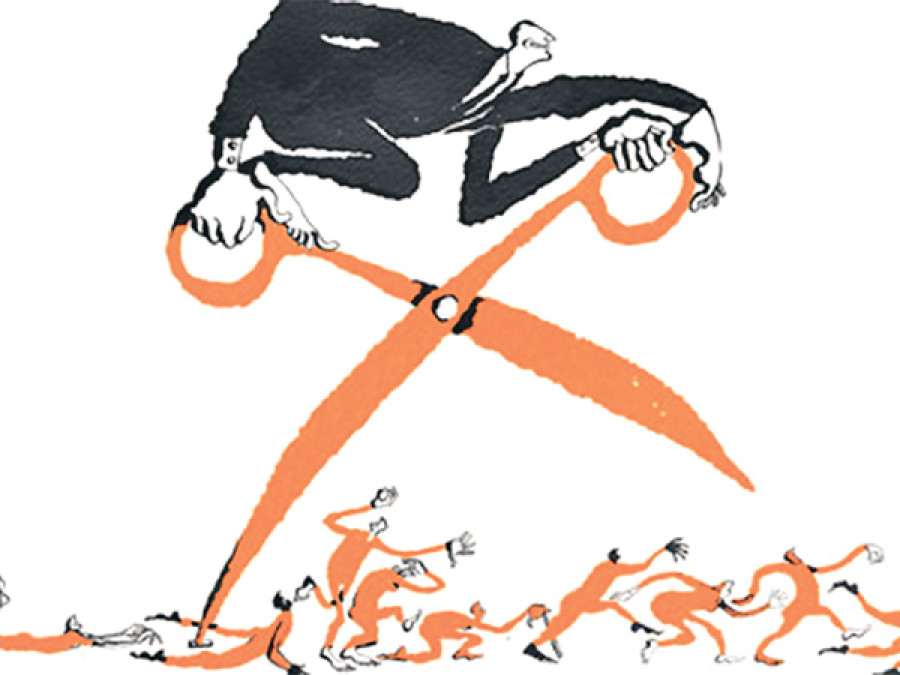Opinion
Rule of the few
Even after repeated struggles for democracy, all that Nepal has is kleptocracy
Sanjay Sharma
When the Rana regime was overthrown in 1950, our grandparents were convinced that Nepal had ushered a new era of democracy and socialism. Land reform, political rights and development, among others, were the buzzwords of those times. After 40 years, in 1990, when our parents took to the streets for the restoration of democracy, their expectations were pretty much the same. In addition, they wanted rapid economic development to displace rampant corruption. During the 2006 Jana Aandolan II our generation also protested on the streets demanding the same things that our grandparents and parents wished for. A few new demands such as inclusion, proportional representation, republicanism and federalism were added. Despite contestations from various groups, the slogans on the streets during the promulgation of the constitution 2015 were again the same—guarantee of equality and the rule of law.
Same, but different
This might make it seem though nothing much has changed during these 60 plus odd years. In reality, much has changed: the rich have grown richer and the poor have become poorer; the Capital and the cities in the plains are have become overcrowded; corruption has increased and so has lawlessness; women and girls are no longer as safe; and going abroad is increasingly becoming the only way to earn a livelihood for many. Few have prospered at the cost of the suffering of a larger populace.
These few individuals—belonging to a certain caste, class, gender, religion, and geography—have dominated politics, bureaucracy, civil society, NGOs, businesses, judiciary, and virtually every place one can think of. This would not have been much of a problem had these individuals worked for the greater good. But, alas, they have thrived on corruption. Collectively, these individuals are known as kleptocrats. The Merriam-Webster dictionary describes kleptocracy as “government by those who seek chiefly status and personal gain at the expense of the governed.” Klepto is the Greek word for thieving/stealing. Even after decades of struggle by multiple generations of Nepalis for democracy, all we have is kleptocracy. This is likely to be handed down to our children and grandchildren too.
Arming the elite
Jared Diamond, the author of the popular book ‘Guns, Germs, and Steel’ (1997), writes about these kleptocrats. He answers the question: ‘What should [the] elite do to gain popular support while maintaining a more comfortable lifestyle than commoners? Kleptocrats throughout the ages have resorted to a mixture of four solutions: (1) Disarm the populace, and arm the elite… (2) Make the masses happy by redistributing much of the tribute received, in popular ways... (3) Use the monopoly of force to promote happiness, and (4)…Construct an ideology or religion justifying kleptocracy.’
The powerful have the many resources to silence or kill others, and enjoy impunity. Lawlessness has become so deep-rooted in our polity and society that even if someone raises an alarm, they are silenced or ignored. The kleptocrats are armed with weapon, with money, with policies, with the police, and with hidden motives; and no one can hurt them. The muted voices of the Adhikari couple and the often-ignored demands of Dr Govinda KC are two of such examples in our society.
Fooling the masses
Earlier, the royals and tribe-leaders used to distribute the resources among the population to give make them happiness and hopeful. Resources are distributed much more subtly these days. Donor agencies release a certain amount of money to be ‘used for the welfare’ of a ‘target group’. However, no one is aware of the amount kleptocrats pocket. With regards to the current crisis in Nepal, politicians/bureaucrats argue that they have ‘equally’ distributed all petroleum that has come in from India to the people. The masses, instead of pressing the government for better diplomacy seem to have bought this statement.
Likewise, the constitution was promulgated and ‘celebrated’ in Kathmandu even as the Army patrolled the streets in the Tarai. And because the kleptocrats are based primarily in Kathmandu, the state always tries to keep the Capital happy. The general assumption is that as long as the people of Kathmandu are happy, the entire country is happy. This ‘happiness’, as we already know, is escorted in trucks from across the border into the Valley.
Justifying kleptocracy
There have been talks of the ‘new force’ and we hear about various political and religious ideologies. People run behind all of them thinking that one day, everything will be fine. But problems only seem to be increasing by the day despite experimenting with different systems of governance. In Nepal’s case, the best dogma that was developed during the Mahendra era and is still widely practiced is nationalism. The kleptocrats argue that our sovereignty is in threat and the masses blindly follow.
So, as Jared Diamond puts it, the kleptocrats run the state and we cannot expect things to be better as long as they continue to wield power. They devise and reinforce various rules and strategies to maintain the status-quo. Some ‘change agents’ might emerge once in a while but they eventually turn out to be just like the rest. And even though they keep failing, they continue to have the popular support. This leaves the people with nothing but hopelessness and cynicism.
Sharma is a student of political science (@chaupaari)




 9.22°C Kathmandu
9.22°C Kathmandu










